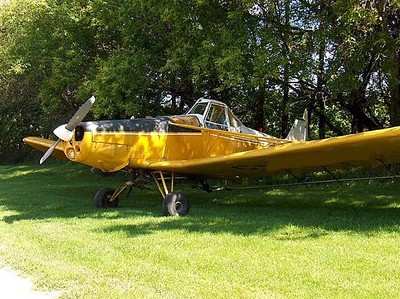Mon, Nov 08, 2004
TSA Issues Alert For Stolen Aircraft
A crop dusting aircraft was stolen from Ejido Queretaro, near
Mexicali, Mexico and has now become the subject of an intensive TSA
search. Although there is currently no indication that this has any
connection to terrorist activity, the theft is cause for concern.
Past information indicates that members of al-Qaida may have
planned—or may still be planning—to disperse biological
or chemical agents from crop dusting aircraft.
The stolen aircraft has been identified as a Piper PA 25,
Pawnee. It is registered in Mexico and bears the tail number XBCYP.
If you see the aircraft described above, you should immediately
contact the TSA General Aviation Hotline at (866) 427-3287.

Law enforcement agencies continue to investigate suspicious
incidents and inquiries involving crop dusters and spray equipment.
In September 2001, the National Agricultural Aviation Association
issued an advisory to its members. The advisory warned members to
“be vigilant to any suspicious activity relative to the use,
training in or acquisition of dangerous chemicals or airborne
application of same including threats, unusual purchases,
suspicious behavior by employees or customers, and unusual contacts
with the public.” The advisory also instructed individuals to
report any suspicious circumstances or information to local FBI
offices.
TSA wants to remind aerial application operators and airport
operators to review the security measures contained in the TSA
Information Publication, Security Guidelines for General Aviation
Airports and the National Agricultural Aviation Association
security measures. For example, aerial application operators and
airport operators are encouraged to consider the following:
- Store aircraft and crop protection products in locked hangars
with electronic security systems when not in use.
- Park and disable loader trucks, forklifts, or other equipment
to block aircraft.
- In cases where the aircraft must be left outdoors, use
propeller locks, propeller chains or tiedowns on aircraft.
- Remove batteries from planes and disassemble engines from
unused aircraft.
- Install hidden security switches to prevent unauthorized
startup of the aircraft.
- Outdoor security lighting around hangars and operations is
encouraged.
- Establish contact with Federal and local law enforcement
agencies to coordinate responses to security breaches at
agricultural aviation facilities.
- Encourage operators to list the appropriate law enforcement
agency telephone numbers in a prominent place within their
operations.
If you see anything suspicious, report it immediately to local
law enforcement and the TSA General Aviation Hotline at 866-GASECUR
(866-427-3287).
More News
Terminal Radar Service Area Airspace surrounding designated airports wherein ATC provides radar vectoring, sequencing, and separation on a full-time basis for all IFR and participa>[...]
Very High Frequency (VHF) The frequency band between 30 and 300 MHz. Portions of this band, 108 to 118 MHz, are used for certain NAVAIDs; 118 to 136 MHz are used for civil air/grou>[...]
“From approximately November 2021 through January 2022, Britton-Harr, acting on behalf of AeroVanti, entered into lease-purchase agreements for five Piaggio-manufactured airc>[...]
Also: Virtual FLRAA Prototype, IFR-Capable Autonomous A/C, NS-32 Crew, Golden Dome Missile Defense Bombardier announced that the first production Global 8000 successfully completed>[...]
Aero Linx: The 1-26 Association (Schweizer) The Association’s goal is to foster the helpfulness, the camaraderie, and the opportunity for head-to-head competition that is fou>[...]
 ANN's Daily Aero-Term (05.29.25): Terminal Radar Service Area
ANN's Daily Aero-Term (05.29.25): Terminal Radar Service Area ANN's Daily Aero-Term (05.30.25): Very High Frequency (VHF)
ANN's Daily Aero-Term (05.30.25): Very High Frequency (VHF) Aero-News: Quote of the Day (05.30.25)
Aero-News: Quote of the Day (05.30.25) Airborne 05.23.25: Global 8000, Qatar B747 Accepted, Aviation Merit Badge
Airborne 05.23.25: Global 8000, Qatar B747 Accepted, Aviation Merit Badge ANN's Daily Aero-Linx (05.30.25)
ANN's Daily Aero-Linx (05.30.25)



